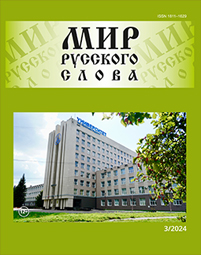From words to images: Metaphorical ekphrasis in the works of Victor Pelevin
DOI:
https://doi.org/10.21638/spbu30.2024.309Abstract
The article is dedicated to the study of metaphorical ekphrasis in the novels of contemporary writer Victor Pelevin. In literary texts, metaphor in ekphrasis represents not only an element of visual imagery creation but also a means of organizing events within the frame of vision. Metaphorical ekphrasis is defined as a type in which metaphor occupies a dominant position in creating a visual image that participates in constructing the ekphrastic narrative and organizing the text’s meaning. Based on the linguocognitive approach developed by G. Lakoff and M. Johnson, as well as J. Miller’s logical theory of metaphor, a series of examples of metaphorical ekphrasis in Pelevin’s novels “Generation P” (1999), “Batman Apollo” (2013), and “Journey to Eleusis” (2023) were analyzed. In each of these texts, metaphorical ekphrasis forms poetic images that, being one of the elements of a multi-layered narrative, contribute to the revelation of the conceptual and philosophical content of the texts and serve as an element of the expression of the author’s individual style. The analysis shows that a key feature of metaphorical ekphrasis is subjectivization, i. e., the dependence of the depiction on the position of the hero or the narrator. Depending on the observer’s viewpoint and the act of observation (represented/unrepresented), metaphorical ekphrasis can perform functions ranging from a simple depiction of analogy to revealing the psychology of characters. The visual discourse in Pelevin’s work occupies a well-defined niche, making metaphorical ekphrasis a key tool in creating multi-layered images that not only visualize the plot but also contribute to the formation of literary cinematography.
Keywords:
imagery, metaphor, image, text, linguocognitive, ekphrasis
Downloads
References
Downloads
Published
How to Cite
Issue
Section
License
Articles of "The World of Russian Word" are open access distributed under the terms of the License Agreement with Saint Petersburg State University, which permits to the authors unrestricted distribution and self-archiving free of charge.




